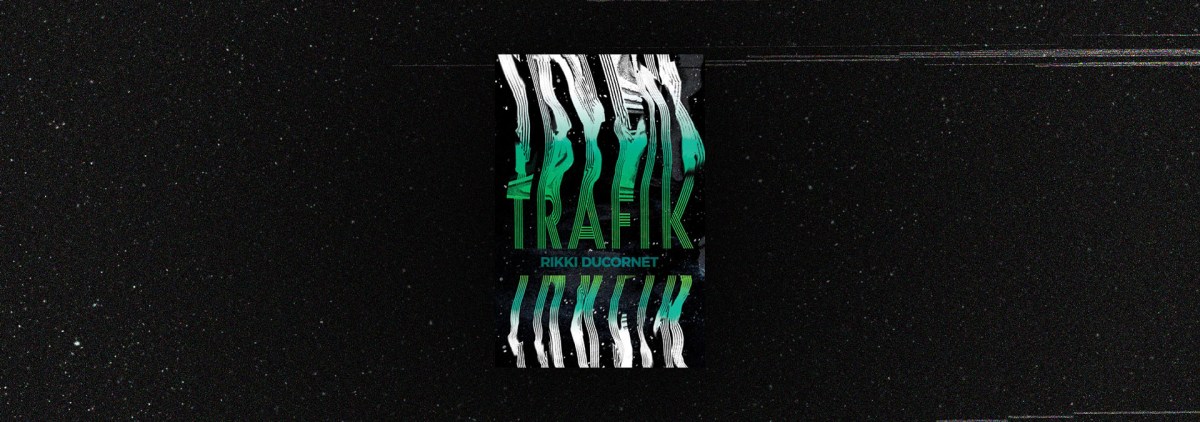[ad_1]
Since her connection with American and European surrealist groups of the 1960s (Arsenal, Phases) Rikki Ducornet has deployed tactics familiar to the historical avant-garde, including an emphasis on gnosticism, cosmology, diablerie, bestiary, eroticism, and revolution, to produce an astounding body of work, cogent and ethical in its beauty and spirit. Ducornet’s early novels form a tetralogy based on the elements: The Stain, Entering Fire, The Fountains of Neptune, and The Jade Cabinet; Phosphor in Dreamland complements this masterwork, and The Fan Maker’s Inquisition delves deeper into certain themes around beauty and brutality. Her short stories, sexy and ribald, mirror these fascinations. And her essays, collected in The Deep Zoo, point to her emphasis on art as a fuse for exploring caverns of the unknown, irreverent in the face of certainty, and flush in the celebration of life.
With Trafik, Ducornet shifts her gaze towards another shared darkness. It’s a sci-fi riff in familiar Ducornet talk. Set in an unnamed future, Quiver, a descendant of modern humans, travels with her partner Mic, an android. Trafik is not meant to be a masterpiece. It’s cagey and incongruous, yet fun and strange, full of gnosticism, and the madcap cosmology of Doctor Strange: “Quiver dreams of Alpha Astron. He dervishes into her dream exploding with rage.. He has a large black tattoo on his neck shaped like an egg. Alpha Astron, she thinks, is an archon.”
And in this hipster convergence of dreams and the cosmos, Ducornet escapes the drudgery and self-seriousness of too many sci-fi parables. Her spirit of surrealism and derision of unquestionable authority cuts through the space noise.
Quiver is unapologetic in her heritage of influence: “It reminded her [Quiver] of Julio Cortázar who, before he died, had the face of a lion… Cortázar who wrote: ‘The red bearded night should see us walking with our face to the breeze.’ Just what, she [Quiver] wonders, is a breeze?”
There is a certain amount of world-building. Quiver and Mic grapple with an encompassing virtual reality called the “Lights.” She is a “transitional prototype,” born from a “dynamic carbon envelope.” But it is light enough to keep the ideas buoyant. Certain futurisms are silly: a kombucha cooler, “A bot will never pass fumes,” and “the Plonk Sidereal Atlas Space Eye.” While many others are familiar. Coming up against the singularity, Quiver muses, “To comprehend the Lights, it would take a lover… to wander the city streets, the evening streets, the autumn paths, the summer gardens, the rubble of war—to understand them and to ask the questions such as: In the streets, were the people safe among themselves? Did the streets ring out with laughter? Just what was it like to sit beneath the sky in a little green boat on a lake? Did the birds fly over the oceans? The mountains? The deserts? The seas? And what of luck? Is this how people found one another? Because they were lucky?”
The space travelers fly through the rubble of human catastrophe, within a named metaphor of slipstream. For Cortázar, the great metaphor was the stream, the passageway, the tunnel, the magic of time travel, Zeno’s paradox. Ducornet references him, saying, “I imagine us being between… I imagine what Cortázar calls the sargassum of time is the shallow sea of space-time and its galaxies that we navigate.”
Sci-fi has a trope (“to boldly go where no man has gone before”) that’s well suited to the historical picaresque, the ribald, the extravagant. The unknown comes and goes. Classical sci-fi feminists like Joanna Russ deride chauvinism, a major concept and the procreative impulse in the genre. And so, too, does Ducornet bring a slapstick quality that parodies the form. But it’s also illustrative of the dream logic of surrealist novels, Nadja, Hopscotch, or Leonora Carrington’s Hearing Trumpet. All in all, the result is essential Ducornet, obscure and extravagant.
This space operetta shouts like Ubu Roi. Ducornet delivers a fascinating addition to her incredible practice. A Jupiter fuse against the void.

FICTION
by Rikki Ducornet
Coffee House Press
Published April 13, 2021

[ad_2]
Source link
